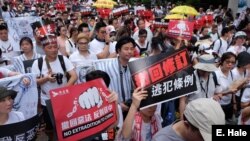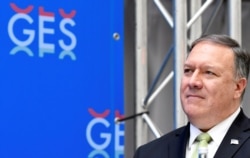U.S. officials and lawmakers are voicing grave concerns over the erosion of Hong Kong's autonomy from China, a day after one of the city's largest protests since its handover from British to Chinese control in 1997.
Hundreds of thousands of people marched in Hong Kong on Sunday to protest a proposed extradition law that would permit Chinese authorities to request the extradition of individuals to mainland China.
"The United States shares the concern of many in Hong Kong that the lack of procedural protections in the proposed amendments could undermine Hong Kong's autonomy and negatively impact the territory's long-standing protections of human rights, fundamental freedoms and democratic values as enshrined in the Basic Law, and the Sino-British Joint Declaration," State Department spokesperson Morgan Ortagus said during a briefing Monday.
Washington believes the peaceful demonstration in Hong Kong shows the public's opposition to the proposed amendments.
"We are also concerned that the amendments could damage Hong Kong's business environment and subject our citizens residing in or visiting Hong Kong to China's capricious judicial system," Ortagus added.
The Hong Kong diaspora and people from more than two dozen cities around the globe also rallied to show solidarity and support the protesters' demands.
Observers fear that the extradition bill, if enacted, would be used by Beijing to grab individuals it couldn't otherwise apprehend, including human rights advocates and other critics of the Chinese Communist Party based in Hong Kong.
On May 16, U.S. Secretary of State Mike Pompeo expressed concerns over amendments to the extradition bill for what he said: "threaten Hong Kong's rule of law."
U.S. officials have said the continued erosion of the "one country, two systems" framework puts at risk Hong Kong's long-established special status in international affairs. The arrangement allows Hong Kong to enjoy self-governance and a high degree of autonomy since the city returned to Chinese rule.
The State Department has noted an increased tempo of Beijing's intervention in Hong Kong's affairs in recent months, with Beijing's implementation of a number of actions that appeared inconsistent with China's commitment to allow Hong Kong to exercise its autonomy.
In a statement Monday, Democratic Congressman Eliot Engel said he shared the concerns that the extradition laws would "do serious damage to the rule of law and self-governance in Hong Kong."
"Beijing's overreach once again calls into question their commitment to honor 'one country, two systems' and lays bare their blatant attempt to squeeze out the freedoms and values that make Hong Kong unique and special," added Engel, who chairs the House Committee on Foreign Affairs.
Republican Senator Ted Cruz, from the Senate Committee on Foreign Relations, tweeted Monday, "The people of Hong Kong are fighting against the tyranny of the Chinese Communist Party. For decades American policy has been built on assumption HK [Hong Kong] maintains autonomy from China & if the CCP forces this extradition law through America must reevaluate that policy."
Chinese officials said the Beijing government would continue to support advancing the proposed extradition law, blaming "foreign forces" they said were getting in the way of domestic legislation.
"We resolutely oppose wrong words and actions by any foreign forces to interfere in legislative matters of the Hong Kong Special Administrative Region," said Chinese Foreign Ministry spokesperson Geng Shuang during a briefing Monday.
The proposed bill would be put up for debate and undergo a second reading Wednesday in Hong Kong's 70-seat Legislative Council, which is now controlled by a pro-Beijing majority.





